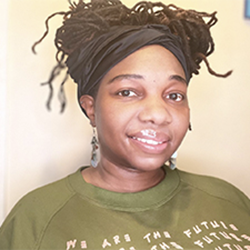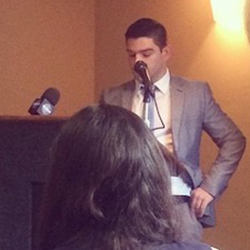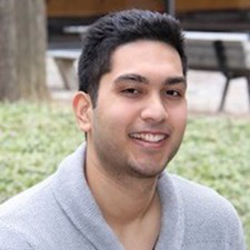Farai Gore

Project Manager, SNAP and Student and Family Advocate program, Delta Family Resource Centre
Social Work, Bachelor of Social Work (BSW)
Please tell us a bit about your social work journey.
I started college in the U.S., where I completed my Associates Degree in Psychology and then my BA in Child Psychology. The Psychology program focused on teaching the medical model, which made me feel uncomfortable to continue to pursue a career in psychology. I was always drawn to social work but chose Psychology because my parents paid my tuition and they didn’t want me to study social work. Throughout my undergrad, I completed two minors in Youth Studies and in Family Violence Prevention with the University of Minnesota School of Social Work. I was determined to be a social worker and found a one-year condensed BSW program in Canada. I applied and got accepted to the program and moved to Canada, a place I had never been to, but luckily my sister and her family had recently moved to Toronto and lived only a few hours away.
The university was piloting the condensed one-year BSW program, so I was one of the first students to enroll, and the first international student. When I arrived and tried to pay my tuition, there was a big discrepancy with the amount I was being asked to pay as I was originally quoted the domestic student tuition amount but, because I was an international student, my tuition was three times more. To fix this issue, I had to work with Ombudsman to resolve this issue. Over the next 12 months, not only was I a full-time student, I was also working to resolve the tuition issue. Thankfully, a few months before I graduated, the School said that they would honour the tuition fees that they originally quoted!
I completed my BSW placement with the same organization that offered me a job and began working in a youth gang prevention pilot project with the national crime prevention center. This role was a continuation from my placement and so I gained a lot of knowledge having completed lit reviews, environmental scans, and all the initial groundwork that would lead to curriculum and program development. This was my dream job; I had always wanted to work with youth in preventative work. I held this position for four years until the organization restructured my role and, without knowing it, I ended up training the person who was to replace me. Unfortunately, I had also applied for my permanent residency and couldn’t leave Canada for a year, so I found a job in the service field. Once I got my Canadian residency, I saved some money, applied to York’s MSW program, and got in! I applied to so many scholarships and bursaries that it paid my full tuition and living expenses. I’m forever grateful for this experience and for being able to graduate without any debt. After completing my masters, I started working in my current role and within a couple years, I began supervising York’s social work students. A few years later, I agreed to be a Faculty Advisor and support a bigger group of placement students. I’ve enjoyed supporting students within these different contexts.
Where do you work, and can you talk about your current positions?
I am the Program Manager for two programs, SNAP – Stop Now and Plan and Student and Family Advocate program. SNAP has three sites in Toronto and is funded by the Ministry of Children and Community of Services and by the Toronto Black Youth Action Plan. The Student and Family Advocate program is also funded by the Ministry of Children and Community Services.
SNAP works with children 6-11, who experience emotional and behavioural challenges who may be diagnosed with ADHD, ADD, ODB, and we support their families by providing counselling and supportive services including community advocacy. When a family is new to Canada, they tend to put a lot of trust in schools to work in their child’s best interest. Many of the children from African decent have been given various behavioural labels, for some they are accurately diagnosed, but for many others, the practitioners didn’t factor in cultural context which increases the possibility that the child will be misdiagnosed. As well, schools regularly discipline children from African decent, in vastly different ways then other racialized or non-racialized children, which contributes to behavioural issues. Unfortunately, I’ve seen some of the destructive ways that teachers respond to children’s behaviours. SNAP works to educate families about their rights, holds schools accountable for their children’s education and to act in the best interest of their child.
The Student and Family Advocate program focuses primarily on the school advocacy, by providing support to these families at school hearings, suspension hearings, and disciplinary action. Unfortunately, most cases we work with are deemed to be in violation of the human rights code because of how these schools aggressively restrain Black children and treat them as though they aren’t human beings. There’s a lot of adultification happening towards Black youth that causes them to be pushed out of schools at early ages. I worked with a family whose six-year-old child had 20-30 suspensions! How can a child that young have so many suspensions at six and what is their trajectory at 7, 8, 9, 10? What is the outcome? If they aren’t welcome at school, what’s the alternative? If mom is constantly picking them up from school, who is watching the child and who is taking care of the other siblings? A lot of what we do is focused on anti-Black racism and creating workshops for teachers and other professional in the field for example child welfare. We engage a lot with child welfare, for instance, because of cultural differences, teachers and schools may not understand the food that is being provided, and they involve child welfare. These situations at school place Black children at a higher risk then other racialized and non-racialized children.
How has the critical approach to social work helped you throughout your career?
In York’s program we talk about intersectionality and how people are impacted differently. This is very true with the people I work with, for example, to best support an immigrant or racialized family, the practitioner will need to look at multiple issues that the family might be dealing with. The practitioner needs to consider the ecological perspective and systemic issues, to find wholistic ways to support this family. If you only stick to one issue, then it tends provide a temporary solution, without a greater impact for future generations. The critical approach also looks at generational trauma or the historical background of racialized groups, and how this trauma effects different communities of people. When you engage in critical thought and begin to analyze systems and people’s experiences, you are forced to examine your own personal perspective and how you came to these ideas. These ways were created to benefit a small group who have a vested interest to maintain these systems. To create lasting change, we need to peel behind the layers and uncover what led these systems to be created, and what we, as individuals, are doing that to uphold of challenge these problematic behaviours or ideas. The critical approach encourages people to challenge and question their own biases and how they continue to perpetuate abusive patterns and harmful behaviours. If we aren’t critical of our own practice, we provide a disservice to our clients and we won’t fully honour their lived experiences and how systemic barriers have impacted their lives.
Could you provide an overview of what a typical day or week might look like?
On Monday is when I have most of my meetings with staff, management, and community partners, admin work, and I will connect with placement students. On Tuesday, Wednesday, and Thursday I focus on programming and support staff and clients. Weekly, I check in on my team to see how they are doing with their cases, and I try to provide the support they need as the job can be hard at times. As a team we complete a risk assessment, as part of the intake, where we gage the level of risk each family is at. When there’s a new client, the staff member presents the case and, as a team, we complete the risk assessment to decide the level of risk and their treatment plan. On these days I connect with school staff and school officials, coordinate meetings, attend suspension hearings, and connect with teachers and principals. I’m also part of a focus table, which aims to unite various community services to support youth and their families which is a partnership between the United Way and the Police. This table is where different community agencies meet and present various situations like case conferencing, for example, if there’s a family who has a history of calling 911 the police recognize that the family would be better supported by a community organization. The police would bring this case to the table, and we would triage by determining acute elevated risk or refer the family to the appropriate agency for support. I will then go back to my agency to coordinate the services that would best support the family. On a continuous basis, I’m involved in community outreach to different partners and agencies for referrals to our programs including teachers, principals, and social workers.
Can you talk about what you really enjoy about your roles and what you find challenging?
I’ve always enjoyed being a Field Instructor so when Vina Sandher, Field Education Manager, came to me and said, “Farai, you’ve been supporting students and so I think this might be a role you are able to take on”, I agreed! When I was asked to be a Faculty Advisor, it really validated my experience and the relationships that have been built over time and has allowed me to support students in a very real way. In my placement, I had some challenges with the matching process resulting in not getting my first choice, which was disappointing, but in the end, I had a great placement experience at York. As a Faculty Advisor, when students have experienced challenges, I can support them because the challenges I had experienced which also helps me to help the placement students I supervise, and with the team that I manage. My goal is to create a learning environment where staff and students can learn and have their professional learning goals met. It has been so rewarding to hear from students about their placement experience and to provide supported along the way. I tell students that social work is a field where they could be my manager and so I want to help prepare them by creating opportunities where that learning can occur.
My biggest challenge is carrying the title of manager because I’ve always enjoyed front line work and have a lot of compassion for children and families. My initial reaction when I was encouraged to apply was, “I don’t want to do management, I don’t want to step away from the front-line work”! Part of my hesitancy is that when you are a manager, the power dynamics shift and you need to balance between creating relationships with staff, but also maintaining healthy and professional boundaries. My goal as a manager is to support my team throughout their professional journey and to create a positive work environment for employees and placement students. It can be hard to build trust with staff members especially when they have experienced toxic workplaces, so I try to encourage each staff member to see their own potential within the workplace.
What did you feel like you took away from the School of Social Work?
The biggest thing I’ve taken away are the relationships and networks that have been built with the School of Social Work. Throughout my educational career, being a Black female, my academic achievements have been questioned a lot of times because of the colour of my skin. As a result, I haven’t always trusted individuals within the teaching profession and so, for me, one of my biggest takeaways is how the School of Social Work has supported me. Over the years, I’ve had many opportunities to build relationships with faculty and staff that have led to some incredible opportunities within the School. This focus on relationship building and being able to see someone’s potential has made the most impact on me and it has inspired be to provide someone else with support who may have had similar lived experiences. Through the strong relationships that have been built has really encouraged me to stay connected with the School of Social Work. You never know where the relationships you’ve nurture will lead you and how they will enrich your life.
Browse more Alumni profiles
Sociology
Bachelor of Arts (BA)
2015
Legislative Assistant, Legislative Assembly of Ontario
Graduate Program in Public Policy, Administration & Law
Master of Public Policy, Administration and Law (MPPAL)
2015
Senior Advisor, Ministry of the Solicitor General
Graduate Program in Public Policy, Administration & Law
Master of Public Policy, Administration and Law (MPPAL)
2014
PhD Student, York University




